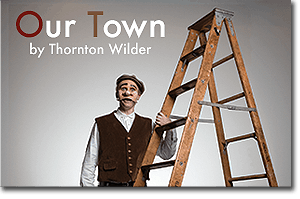It’s kind of a tossup these days whether Matthew R. Wilson is more newsworthy because he’s leaving as artistic director of Faction of Fools, the Commedia dell’arte company he founded, to teach performance at the University of Mississippi—or because he’s giving the Commedia treatment to an unlikely American classic, Thornton Wilder’s Our Town.
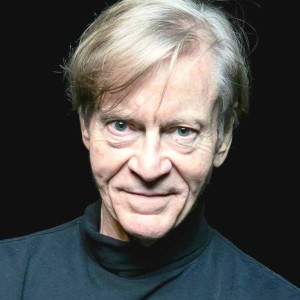
I do not recall that Grovers Corners had a mask shop.
But having watched in fascination a preliminary workshop of the Faction of Fools Our Town at Arena’s Kogod Cradle in January of last year, I was eager to know what had become of the show that’s now being fully staged. (It runs May 28 to June 21, 2015, at Gallaudet University’s Elstad Auditorium.) I asked Matthew if I could drop by a rehearsal and then have a chat. We talked about the show. And then about him.
John: Faction of Fools is known for adapting classics “capital C” like Shakespeare. Why Thornton Wilder, why Our Town?
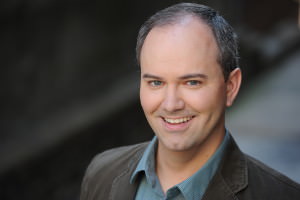
Matthew: For us working with an established American text started at the Edward Albee Festival at Arena Stage a few years ago when we were playing around with Albee’s The Sandbox. Albee in that piece and Wilder in Our Town were pulling from the European avant garde playing around with ideas that were then experimental but now have become classical.
Wilder wrote a play with no set and no props where somebody stops the action periodically to talk to you about the fact that it’s a play. In 1938 that was a pretty jarring thing to do. Our hope is that by taking this play that everybody thinks they know and looking at it through a different lens, we can make it jarring again.
I noticed in rehearsal you’ve kept the simplicity of set the play calls for: ladders, tables, and chairs. You’ve also added elements, the masks being part of that. How would you describe the way Faction of Fools is doing the play?
We always ask ourselves two questions when we approach an established text: What does this play have to say about Commedia dell’arte, and what does Commedia dell’arte have to say about this play? And if we can’t answer both questions well, we don’t do it.
The point is not to make a joke or to trivialize or to create our own deconstructed hodgepodge mashup of something. The point is to say: Is there actually a valuable conversation to be had between this style and this text, this work? So the first question was pretty easy to answer. If Thorton Wilder was looking at these classic American character types, okay, Commedia dell’arte is looking at these universal human types. Is there some relationship there? We thought, Yeah, there probably is.
I remember at the Kogod Cradle workshop you talked about the character archetypes in Our Town and how that relates to the archetypes in traditional Commedia dell’arte.
There’s a lot of similarity. Most Commedia plays and Our Town center on a pair of young lovers and how they grow up and how they grow together and the struggles that they have being together. The Commedia dottore character is present in Our Town in Professor Willard and Doc Gibbs. So it seems there’s something that Thornton Wilder is seeing in the world that relates to something that Commedia artists saw in the world about the kinds of people around us.
Did you make changes in the script to make this work, or are you doing it as written?
No, no, not at all. Exactly the original script.
When I was watching rehearsal, the thought crossed my mind that there are aspects of this that resemble a clown show because it gets very funny. Are there ever points when you have to force yourself to draw the line in between having fun with the play and making fun of it? Or is that not a Commedia question?
Absolutely it is. Certainly at this point in rehearsal we’re still seeing a lot of things out of order, and you work a little here and then you go over there and go, “Ah, we fixed A and that broke B.” So yeah, definitely there is a process as you start to put things together, editing through and going “Okay, this was a fun moment, but it’s now going to undercut this other thing. Or we’ll change the logic of that or the dramatic progression of that.” I always try to go back to the text and say, “Okay, what is the text saying? What do the characters really want? What is the story about in this moment?” And then from there say, “Okay, what’s the physical action that springs from that thing?”
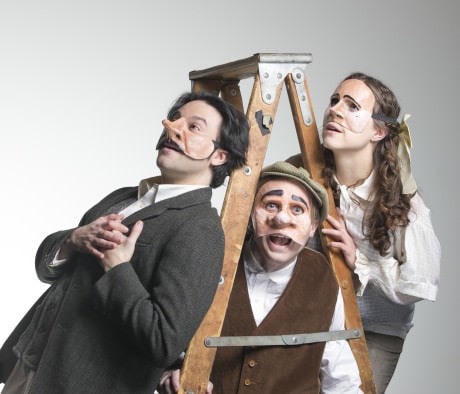
One of the things that audiences will notice right away that you added to Our Town is a really detailed world of sound effects created by Roc Lee and performed live stage left and right. Would you say more about that? It’s as if the sound becomes another character.
It really does, and we’re not the first production to incorporate live Foley, but it seemed important to me. The play is constantly reminding you that it’s a play and showing you the conventions by which the play is made. And so you see the stage manager talking. You see tables being carried around. You see bodies in space creating a world that doesn’t otherwise exist. So I said, “Yeah, we want to see the mechanism by which we create the sounds as well.”
When I was watching the rehearsal, I became aware that from an audience point of view, one function of the mask is to remove visual information that I usually rely on, facial expression, and increase my attention to other visual information, body and gesture. In a sense what audiences are doing when they’re watching Commedia is mentally subtracting something they’re used to and amplifying something else. Is that a fair characterization of an audience relationship to Commedia?
Absolutely.
Okay so how does an actor cancel out what their face usually does? And how does the mask alter the relationship between emotions that are more typical of naturalism and other forms of unmasked theater? What’s going on for the actors inside those masks?
That’s a really interesting question. As you were talking, I was reminded that The Simpsons are in the news now because Harry Shearer has just left. Several years ago, the cast of The Simpsons did Inside the Actor’s Studio, and they would answer questions in character. I was totally fascinated by Dan Castellaneta next to Harry Shearer and Hank Azaria. When Dan Castellaneta does the character voices, his face, his body, everything is totally neutral and relaxed. He’s not gesturing; he’s not adopting the character physically at all. He’s approaching it entirely with an emphasis on voice, whereas Harry Shearer and Hank Azaria are doing the whole character. Even facially you can see aspects of the cartoon in their face, and they’re doing the gestures. So it was interesting to see these craft people approach this entirely differently as to what it is they’re doing and how they bring it out in their work.
https://vimeo.com/115887786
I hear you saying that for Commedia actors, it’s a personal matter to what extent their faces are isolated and made vacant, because it doesn’t really matter whether the actor is having expressions under the mask or not.
Exactly.
And so the actor doesn’t have to think about it.
Right. I suspect for some people you would find them really thinking about their knees and their hips and their shoulders and locate a character there, probably canceling out a lot of the face work. With other people you would probably find if you took off the mask they were being incredibly expressive with their face underneath. That’s just not information you’re getting, but it is part of what they’re doing to create the information that you are getting.
I remember the workshop at Kogod Cradle, and there was an incredibly moving point during the graveyard scene when the actors’ removing their mask indicated their character had died. When that happened during the rehearsal, it completely brought back the emotion I felt in the workshop. It’s so powerful.
Well, thank you.
Commedia dell’arte has been your artistic passion and your theatrical profession for a long time. Do you remember how you first fell in love with the form?
When I was a freshman in high school, my drama class went to see Twelfth Night at the Tennessee Repertory Theater. It was the first professional production of Shakespeare I had ever seen, and I was blown away. I left thinking, “I want to be like that guy who played Feste; I want to be able to do that someday.” Thankfully I was aware enough at the time to know, okay, he can do a lot of things that I can’t do, so I’m going to have to learn about this stuff if I want to do that. That’s when I started exploring clown and mask work and physical theater skills, and it took off from there.
At what point did you know you wanted to be a director?
I’ve always liked making shows and doing whatever I needed to do or could do to make the shows. I started producing and directing with the student group in college. I was working at summer theater camps where I would stage manage or teach combat or movement or whatever was possible to campers. The more I kept doing it, the more I kept doing.
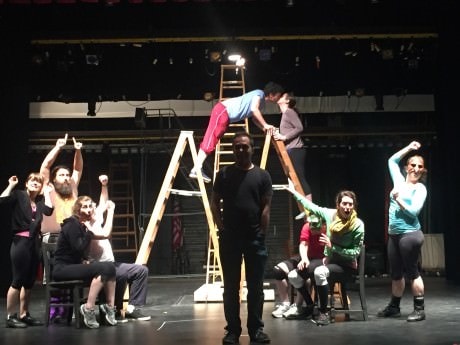
Commedia is an old, old form. How do you see its relevance now? What does it do for audiences today?
We’re in a post-naturalistic era for theater and the performing arts in general. We’ve seen a shift in the last couple decades away from the naturalism that ruled most of the twentieth century. And things like Cirque du Soleil or Blue Man Group have become really popular. Even on television and movies, you saw the return of the musical, going back to the hit Chicago, or the television show Glee, where you know you’re watching something that isn’t everyday life. Even a show like Modern Family or a drama like House of Cards is constantly breaking a fourth wall.
Right now audiences are saying, “Oh, I want to get into and be a part of this story rather than just being a voyeur. I want to see things in my art that I know aren’t real life but are somehow true and entertaining and captivating.” So for me Commedia dell’arte seems where performers and audiences both right now are going, “Okay, if I want to look to something that is current and innovative, I can take resources from the past as well”—from a time before the fourth wall had been thought up.
You move seamlessly between the rehearsal room and the lecture room. You’re not someone who teaches because you can’t do or does because you can’t teach. You move easily between the theater and the academy. Which came first, and how did you find that fluency?
I’m excited by the moment of understanding—the lightbulb moment, that gasp of “Oh, I’ve just gotten something that I haven’t gotten before.” In working in a rehearsal room, discovering things creatively, I get to experience that. Going to a library or a conference and thinking through things intellectually, I get to experience that. And whether it’s producing something for an audience to experience in a theatrical setting or delivering something for a classroom of students to experience, if I get to provoke that in other people, that feeds me.
There are a lot of folks in town, younger people particularly, who aspire to your ease transforming expertise from academic to practical and back to academic. As someone who has really developed that ambidextrousness to a fine art, what’s your advice to them?
A wise old scholar once said to me, Keep learning all your life. Curiosity, not taking for granted what’s around you. The curiosity to go, Oh, let me look at that longer or let me look at that from a different angle because there’s a lot to uncover.
You’re passing the baton to Toby Mulford, though you’ll be coming back to town to direct.
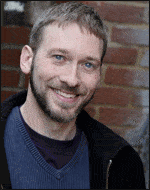
Well yes, I do want to stress that I am coming back. A factor of the job that made everything work for me was that the University in Mississippi said, “We want you to work, we need you to work, we’ll support you going out and working and figure out how to make that balance.” I want to maintain as many connections to DC as possible and come back as often as I can, because this has been my career and home for a long time. As recently as four months ago, I would not have envisioned ever leaving. But I’m an improviser by trade, and you always say yes.
One thing that really excites me is that Toby is a tremendous educator and has personally really invested in his own constant training, and I think the company will take those things more seriously even than we have in the last six years. I think you’ll see an ensemble that grows up together and matures to the next level beyond what we’ve already even done.
What are your feelings about leaving the company you founded?
Really bittersweet. I’m going to miss a lot about being here. I’m not going to miss traffic. But everything else I’ll miss a lot. But there are exciting adventures to be had elsewhere. Choosing is losing.
Anything else you would want people to know that would make audiences know that Our Town is something that they didn’t expect and will enjoy?
One of the best comments to come out of the Arena workshop was a woman who said, “I always cry at Our Town, but at this one I laughed and cried.”
Our Town plays May 28 – June 21, 2015, at Gallaudet University Theatre Arts Department’s Elstad Auditorium – 800 Florida Ave NE, in Washington, DC. Purchase your tickets here.
LINK
Toby Mulford Named the New Producing Artistic Director of Faction of Fools.


